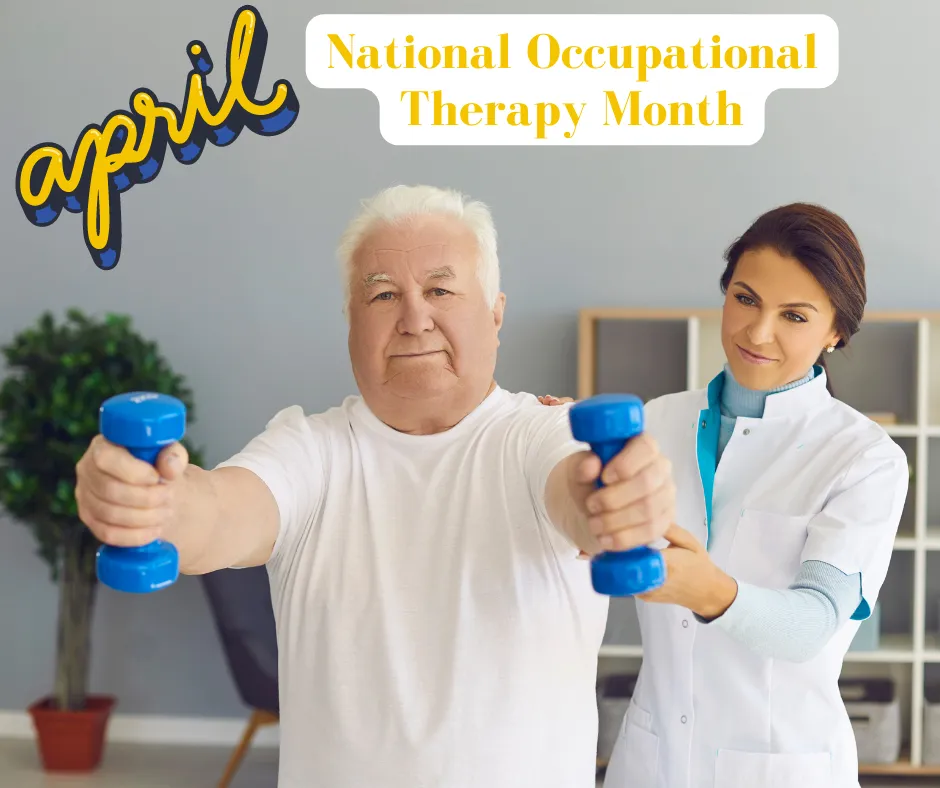Helping Seniors with Independent Living Through Occupational Therapy
April is National Occupational Therapy month. Occupational therapy (OT) helps people of all ages maintain, or regain, the skills necessary to perform daily activities. Similar to physical therapy, OT provides countless benefits throughout the body. While Physical therapy focuses on improving pain in one part of the body, Occupational therapy is focused on adapting daily tasks to make them easier.
Physical Benefits
Occupational therapy helps strengthen the body by reconditioning muscles, adapting movements that puts less stress on the joints and muscles, and increase flexibility.
Improved Range Of Motion
Improving flexibility can have a great impact for seniors. Stretching allows the body to be less rigid and can decrease the chances of injuries like muscle pull or strain. It can also make daily tasks – like walking, vacuuming, or gardening easier. There are different methods for better range of motion. For example, to improve leg flexibility, an occupational therapist might suggest seniors to complete a series of leg stretches, practice dressing the lower body, and work on strength training exercise for that area of the body.
Reduced Chronic Pain
Seniors who live an active and fulfilling life may have chronic pain, like muscle aches or arthritis that can slow them down. However, with the support of an Occupational Therapist, they can help reduce the symptoms of chronic pain.
In helping with pain management, Occupational Therapists can show their clients different techniques for daily activities that are most important in day-to-day living. Reduced muscle tension, safe body mechanics, ergonomics, and neuromuscular re-education, are some terms and strategies used by Occupational Therapists. Basically, these are alternative ways and methods to complete tasks with minimal strain, and thus less pain on the body.
Increase Mental Health
The benefits of Occupational Therapy far exceeds physical improvements. Cognitive functions like brain and memory capacity can increase as well. It may even help alleviate anxiety and stress.
Improved Memory And Enhanced Brainpower
Occupational therapists are trained professionals who assesses thinking skills along with physical abilities. There are different methods that can be used to improve mental function.
Memory-enhancing activities like brain teaser games or crossword puzzles are highly encouraged to keep the mind sharp. OT may also include more challenging tasks and break them down into a smaller simpler steps and cues, making it easier to complete for those who have loss of memory.
Occupational therapists can also work with seniors on exercises that can improve vision as well. It may not seem like they are connected, however increased in sight can allow seniors to process and gather information more easily, thus improving their cognition.
Lowered Stress And Anxiety
As we age, our abilities to do daily tasks often goes down, which in turn takes a toll on our mental health. Seniors might start feeling depressed or helplessness due to a decline in function. Working with an occupational therapist, however, will focus on the tasks that can be accomplished. This in turn, motivates seniors with a sense of empowerment. With other skills that are less manageable, OT can help in detecting these skills and works to improve them.
Learning to Adapt
Occupational therapy aims to enable seniors to live more independently and comfortably. By improving the physical and mental well-being is definitely helpful in maintaining personal freedom. With the help of OT this can surely surpass expectations.
Adjustments At Home
Occupational therapists will not only work with the body and mind to make senior living easier, they will also help in adjusting life at home with the same end goal.
Here are some ways Occupational Therapists might change a living space for better daily functionality:
• Re-label cooking items and cleaners to easy readability for those who have trouble seeing.
• Increase lighting in darker areas of the home to see certain areas
• Suggest adding handrails in the bathroom for fall safety
• Adding visual cues throughout the home to help seniors with dementia or loss of memory
Share The Knowledge
It’s helpful to frequently support and encourage family members and caregivers to get to know the exercises their senior loved one has been practicing during their OT visits. This will allow continuation of their improvement to go beyond their appointment and use them at home. Seniors who acquire their knowledge from therapies into their daily routine, can make their life easier, staying mentally fit and physically active. San Diego Compassionate Caregivers is happy to assist seniors who need help in completing their day to day routine through lessons learned from their Occupational Therapy.

